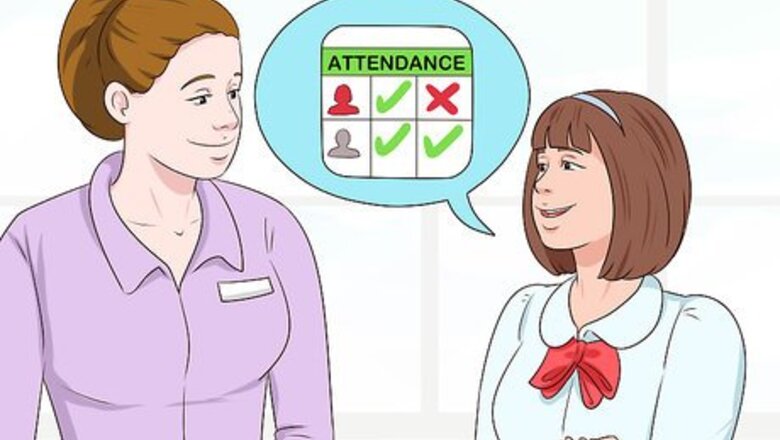
views
Talking to Teachers and Friends
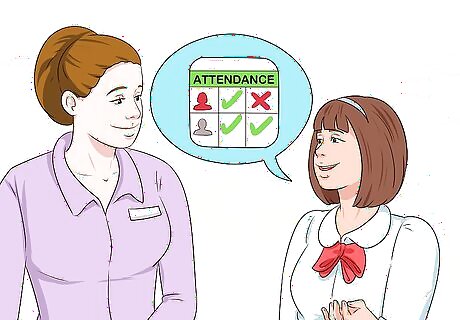
Let your teacher know of your absence in advance, if possible. You never know when an illness or family emergency will strike. However, if this absence is planned, let all your teachers and the school administration know in advance. That way, they can get make-up work to you as soon as possible. Say something like, “I’m sorry, but I’ll be out of class tomorrow for a family reunion. Please let me know what I need to do to stay on top of my work.” You may need to provide a note from a doctor or parent. Check with your school administration to find out.

Communicate with your teacher after unexpected absences. Stay after class to talk with your teacher one-on-one, or head to their office during your free time. Explain the situation, let them know you’re trying your best to catch up, and ask what you missed. If you’ve missed several days, it’s a good idea to email your teacher instead of waiting to talk in person. Say something like, “I’m so sorry I was out yesterday with the flu. I’m doing my best to get back on schedule. Is there anything important that I missed?”
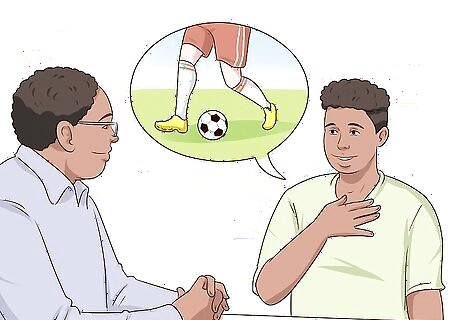
Be honest if the missed work wasn’t absence-related. Sometimes, you might forget to complete an assignment, run out of time, or simply feel too tired. In cases like these, it’s important to be honest with your teacher about the situation. Explain why you missed the work and tell them you're ready to work hard to get back on track, You might say, “I’m sorry, I’ve been really busy with soccer lately and I’ve fallen behind on some assignments. I want to do everything I can to catch up. What would you recommend that I do?”
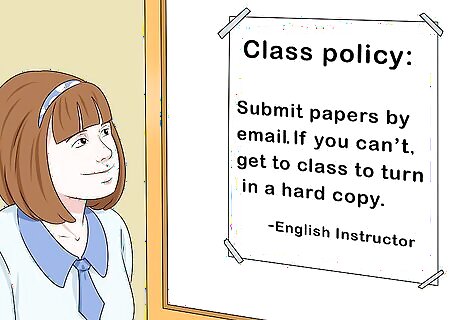
Be aware of class policies. Take note of any rules your teacher has regarding missed assignments. For example, they may require that you submit papers by email if you can’t get to class to turn in a hard copy.

Talk to friends about what you missed. Your friends can fill you in on information covered and any assignments or activities you missed. They may also be able to lend you their notes. While talking to students is helpful, it shouldn’t be a substitute for communicating with your teacher. Ideally, you should do both.
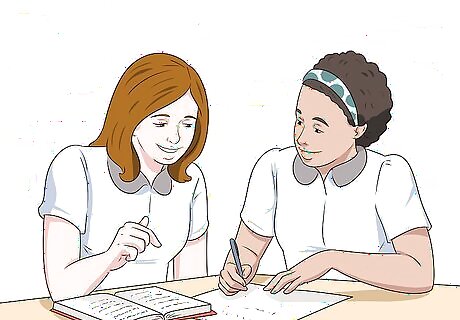
Get help for difficult subjects. If you were already having a hard time in a class, missing school can make it even worse. If you feel lost or overwhelmed, reach out to your teacher, TA, classmates, or a tutor for help. You may be able to meet with your teacher before or after class for extra help. Keep in mind that your teacher probably won’t have time to re-explain the entire lecture. Look over all your notes and materials beforehand so you’re as prepared as possible. It may be helpful to come in with a list of questions.
Making a Plan
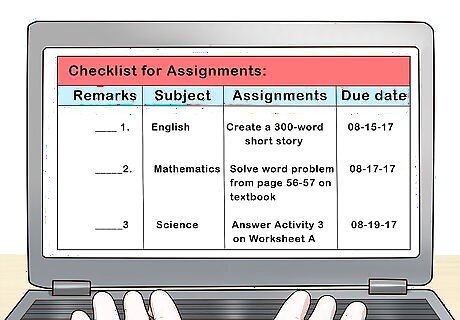
Create a chart or checklist. Create a chart or checklist of all the assignments you need to accomplish. Include due dates to help with prioritization. You can make your checklist on a whiteboard, a piece of paper, or on your computer. Just make sure it’s in a place where you can easily refer to it. Break down big assignments into smaller sub-steps, and nest these under the big assignments on your checklist. Don’t forget to check off items when you complete them! It’ll feel super satisfying.
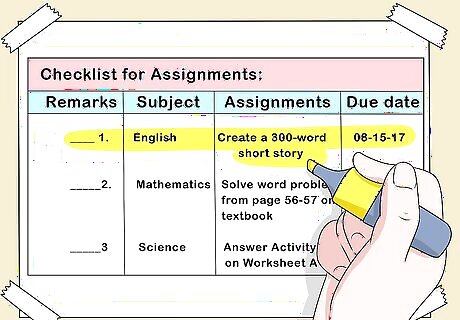
Prioritize. Once you make your checklist, prioritize your items. You should tackle assignments with the most pressing deadlines first. You may also want to prioritize academic classes over electives. Put a star next to your top items or highlight them. You can color code by priority, underlining the most pressing items in red, the moderately pressing ones in yellow, and the least urgent ones in green. If you’re having trouble determining a top priority, ask yourself, “If I only had time to complete one assignment, which one would it be?”
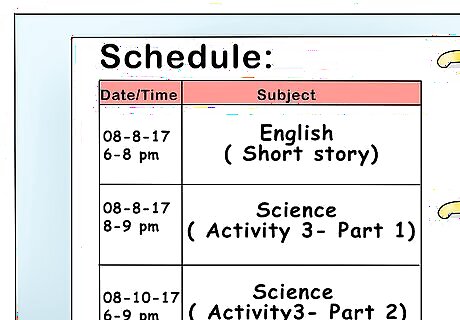
Make a schedule. After you’ve made a checklist and determined the most important items, it’s time to create a schedule for tackling your work. Do your best to estimate how long you’ll need for a given assignment, and assign different tasks to different days depending on your priorities. More pressing assignments should be scheduled earlier. If you need even more structure, you might schedule your workload by time of day (morning, afternoon, and evening) or even by the hour. Input your schedule into a planner or online calendar and refer to it regularly. Consider turning a weekend into a “Homework Retreat”. Schedule out an entire weekend to do the assignments you missed. However, don’t overstretch yourself, and make sure to schedule breaks, snacks and other things to keep you energized.

Don’t neglect new assignments. It’s easy to get caught up in all your make-up work, but don’t forget that you may have new assignments, too! Don’t delay important tasks until they become very urgent. If you’re unsure about what to prioritize, talk to your teacher.
Being Productive

Approach the situation with a positive attitude. A positive mindset increases productivity, while a negative attitude worsens procrastination. Try to be optimistic about your workload and abilities. Positive self-talk is your friend. Tell yourself you can do it! Say to yourself, “I’ve got this. I’ve caught up on work in the past, and I can do it again.” It may help to do something fun before you buckle down, like going for ice cream with friends or taking your dog on a walk.

Take advantage of your time. You may have pockets of free time here and there throughout your day. If you spend this time catching up on work, it can add up. For example, you might be able to do homework on the bus or while you’re waiting to be picked up from soccer practice.
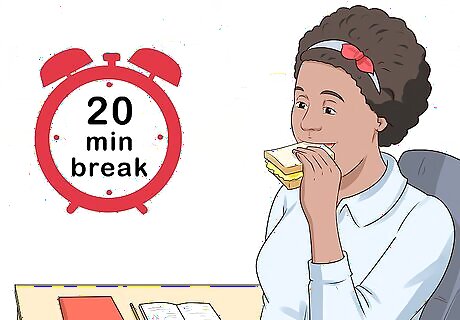
Take breaks. Yes, it’d be nice if you could sit down for twelve hours straight and crank out all your missed work. However, taking breaks actually increases productivity. Try to take a 20-minute break every hour or so. You should do something completely unrelated to your work during your breaks. Look at funny memes, take a walk, grab a snack, or chat with a friend.

Make progress. Progress is the best motivating force, so start working as soon as possible and monitor your activity. Acknowledge when you make a little progress and congratulate yourself.

Reward yourself. Reward yourself for finishing tasks on your to-do list. Rewards can keep you motivated and put you in a more positive mindset. Make sure your rewards are appropriate. Don’t give yourself a huge reward for finishing a relatively small task, and don’t select an insignificant reward for a major task. Make your rewards meaningful, specific, and immediate. For example, you might reward yourself with a quick trip to your favorite restaurant for lunch.

Find a productive study buddy. Doing work with a friend who’s focused and determined can help boost your productivity. Invite an academically successful friend over for a study session, and hold each other accountable. It's fun to laugh and joke with friends, but do your best not to get distracted. Take turns reminding each other to stay focused.

Get enough sleep and eat well. While you might be tempted to abandon your usual sleeping and eating patterns to get all your work done quickly, don’t. You need to get enough food and sleep for proper cognitive function. Ignoring your body’s needs will only slow you down. Teens need around eight to ten hours of sleep each night. For better sleep, try to go to bed around the same time everyday. Staying up late on the weekends can hurt sleep quality. Eat a balanced diet containing lots of fruits and veggies, whole grains, and lean proteins, like chicken. Always eat breakfast, and drink water throughout the day to stay hydrated.
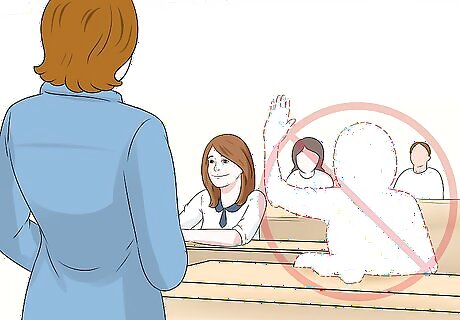
Avoid missing class if possible. You should only miss school for important or unavoidable reasons, like illness or special family events. Occasional absences happen, but missing class should not become a habit. Don’t cut class because you don’t feel like going or because you'd rather hang out with friends. Do your best to balance your social life, extracurriculars, and schoolwork.




















Comments
0 comment